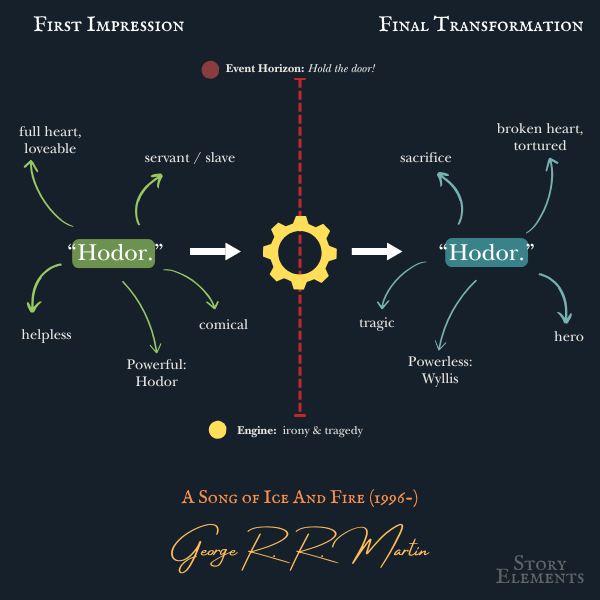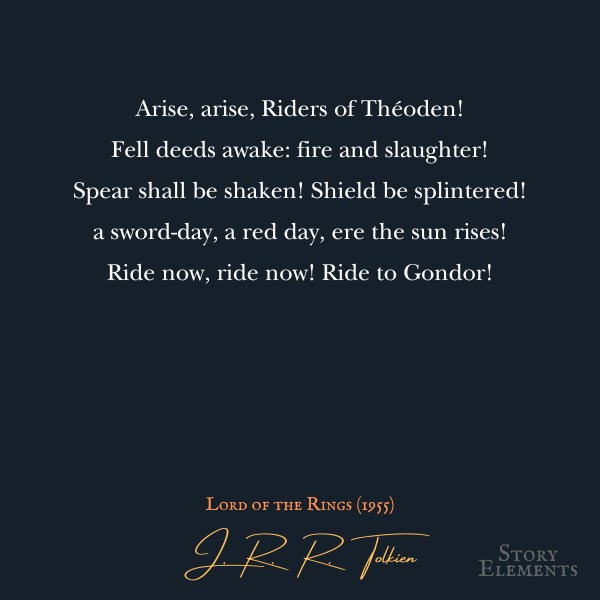- Story Elements
- Posts
- #004: How to Wield A Name, Pt. I
#004: How to Wield A Name, Pt. I
"A Song of Ice and Fire" (1996-) by George R. R. Martin

Few will forget that fateful day. Some may still have an angled slice of wood wedged beneath their door bearing a single name: Hodor.
That’s the power of a Name. And George R. R. Martin wields them with the same proficiency as The Hound wields profanity.
“Hodor” is the first of many names we’ll break down. It’s a prime example of how a name can be more than a label—it can be a device used to chisel its way into our imaginations and literary history. The key is a name’s reputation.
Power. Identity. Ideals. Social Context. Fate.
Legendary names are vessels, and when crafted and wielded to perfection, they become more than just characters. They become symbols. Think of some of the most famous names in literature and you’ll find them all there.
Muad’dib, the tiny desert mouse, lost in a sea of giants.
Voldemort, the Dark Lord whose name must not be spoken.
Ebenezer Scrooge, the grumpy geezer whose very name conjures bitterness.
All it takes is a few syllables and our imagination leaps into motion, pulling us into the worlds they inhabit and the moments their names became immortal. But before that fateful horizon, there are expectations to be laid.
1. First Impression
Our first impression of a character frames our expectations of them. In other words, a name isn’t just a label … it’s a setup. And the way an author crafts a character and their name is the way they prime our expectations.
Take Hodor. Martin gives us a harmless giant, one who is loveable, comical, abnormally strong, yet so simple he’s helpless. Even the texture of his name feels soft, warm, almost cushioned. Hodor. No sharpness, no edge. Just a gentle sound.
The bar couldn’t be lower for what we expect Hodor to accomplish. He’s a servant, confined to carrying the Stark boy wherever he commands. Yet, we know he’s important. Bran would be dead without him. And there’s a mystery about him too. He only says one word—Hodor. And over time, since the characters accept it as his name, we, too, come to accept it without question. Little do we know that Martin is concealing the truth until the very moment he can shatter our expectations.
But beyond that, we don’t expect Hodor to shape the fate of the Seven Kingdoms. And that’s exactly what makes his event horizon so powerful.
2. Event Horizon & Engine
It’s the point of no return. The moment a name is forged and sealed, forever altering how we see the character. Done well, it’s the kind of moment that you wish you could relive for the first time.
Sometimes, it builds slowly. Other times, it strikes all at once. Either way, the event horizon has one objective: to subvert our expectations. The engine behind that subversion is often irony, when a name’s meaning is completely opposite to its eventual fate, and it works best when our expectations of a character are set very high, or very low.
The irony in Hodor’s name is that he transforms from a helpless giant, good for little more than carrying a crippled boy, to a hero who alone holds back the most powerful villain in the Seven Kingdoms, the Night King, and his army of dead. It’s this giant leap that sticks with us. That makes us proud of Hodor. But it isn’t the only engine driving Hodor’s transformation …
At the same time that Hodor transforms into a hero, we also see what it costs him: his true name. Wyllis. It’s a tragedy Martin set up the moment he created Hodor, a tragedy the harmless giant was fated to.
Hold the door!
Holdthe door!
Holthedoor!
Holtdor!
Holdor!
Hodor!
Hodor …
Hodor.
And the transformation is complete. Wyllis is erased. And the word we thought was nothing more than a simple quirk is revealed to be the mark of his doom. A reality that plays out before our eyes in one of the most tragic reveals. And when it’s over, it feels as if Martin swung a great sword through every string that held up our hearts.
3. Final Transformation
From servant to sacrifice. From helpless to hero. From the powerful giant named Hodor, to the powerless child once named Wyllis. It goes without saying, transformations work best when they use contrasts.
But opposites don’t just paint a clear image, they hold the weight of an entire emotional arc between them. And the name, Hodor, absorbs and reflects the emotional charge of the entire story. That’s what makes it last.
So, when you craft your next name, remember, the trick lies in its reputation. Set the bar of expectation low (or high), build toward the moment your character’s story crosses with their name, then use that moment to subvert all expectations in one epic stand. And leave readers with an emotional payoff they’ll remember every time they hear your name.
Passage to Ponder: How to Prepare for War

Reply